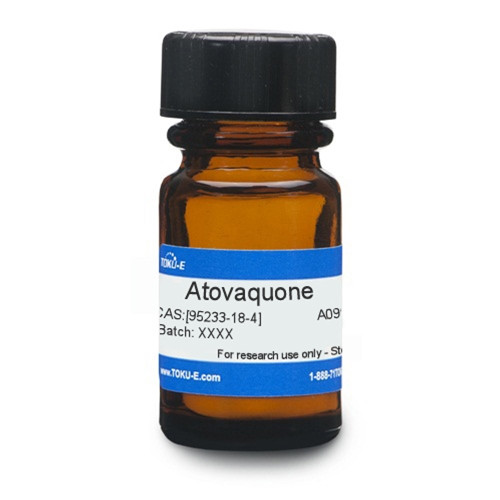Atovaquone is a hydroxynaphthoquinone antimicrobial compound with antipneumocystic and anti-parasitic properties.
| Mechanism of Action | Atovaquone inhibits cytochrome bc1 of the electron transport system leading to failure of mitochondrial function. |
| Spectrum | Atovaquone is active against Plasmodium spp, Pneumocystis carinii, and Toxoplasma gondii in vivo and in vitro. |
| Impurity Profile | Related Substances (HPLC): RRT - 0.63: Not more than 0.5% RRT - 0.89: Not more than 0.3% RRT - 1.8: Not more than 0.5% Related Compound A: Not more than 1.0% Any other impurity: Not more than 0.2% Total other impurities: Not more than 1.0% Total impurities: Not more than 1.5% |
| Molecular Formula | C22H19ClO3 |
| Solubility | Freely soluble in N-methyl-2-pyrolidone and in tetrahydrofuran; slightly soluble in ethyl acetate; insoluble in water |
| Impurity Profile | Related Substances (HPLC): RRT - 0.63: Not more than 0.5% RRT - 0.89: Not more than 0.3% RRT - 1.8: Not more than 0.5% Related Compound A: Not more than 1.0% Any other impurity: Not more than 0.2% Total other impurities: Not more than 1.0% Total impurities: Not more than 1.5% |
| Residual Solvents | Methanol: Not more than 2000ppm Chloroform: Not more than 60ppm Dichloromethane: Not more than 600ppm Acetonitrile: Not more than 410ppm |
| References | Looareesuwan, Sornchai, Jeffrey D. Chulay, Craig J. Canfield, and David B. Hutchinson. "MALARONE (ATOVAQUONE AND PROGUANIL HYDROCHLORIDE): A REVIEW OF ITS CLINICAL DEVELOPMENT FOR TREATMENT OF MALARIA." The American Society of Tropical Medicine and Hygiene 60.4 (1999): 533-41. Nixon, G. L., D. M. Moss, A. E. Shone, D. G. Lalloo, N. Fisher, P. M. O'neill, S. A. Ward, and G. A. Biagini. "Antimalarial Pharmacology and Therapeutics of Atovaquone." Journal of Antimicrobial Chemotherapy68.5 (2013): 977-85. |



